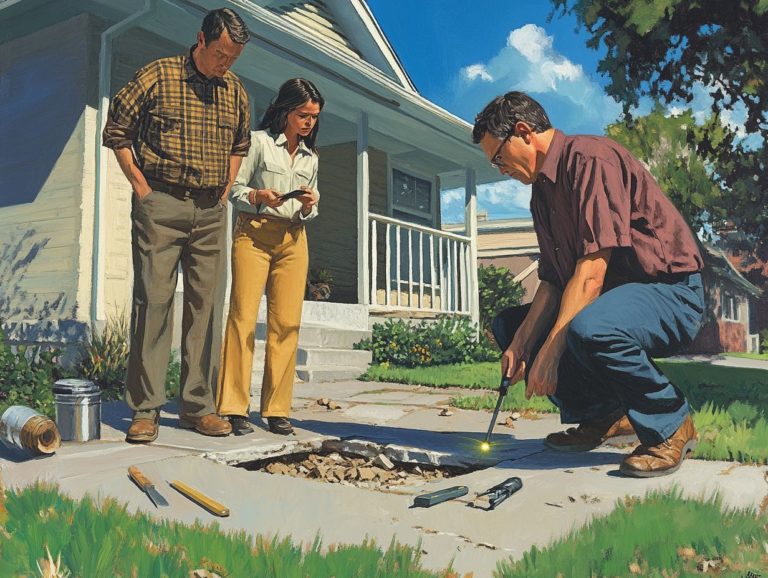How to Make Sense of Home Inspection Terms
Navigating home inspections can feel overwhelming, particularly with many technical terms that can leave you perplexed. Understanding the essence and significance of a home inspection for both prospective buyers and sellers is your first vital step. This article aims to demystify common home inspection terminology, encompassing everything from structural components to mechanical systems, enabling you to interpret your inspection report with clarity.
You ll also discover how to select the right home inspector, ensuring that your investment remains secure. Immerse yourself in this essential knowledge that can truly elevate your home-buying experience.
Contents
- Key Takeaways You Can’t Miss!
- Understanding Home Inspection Terms
- Common Home Inspection Terms and Definitions
- Interpreting Home Inspection Reports
- Choosing a Home Inspector
- Frequently Asked Questions
- What are home inspection terms?
- Why is it important to understand home inspection terms?
- How can I make sense of home inspection terms?
- Are there any resources available to help me understand home inspection terms?
- Can I negotiate repairs based on home inspection terms?
- Do all home inspection terms have the same meaning?
Key Takeaways You Can’t Miss!
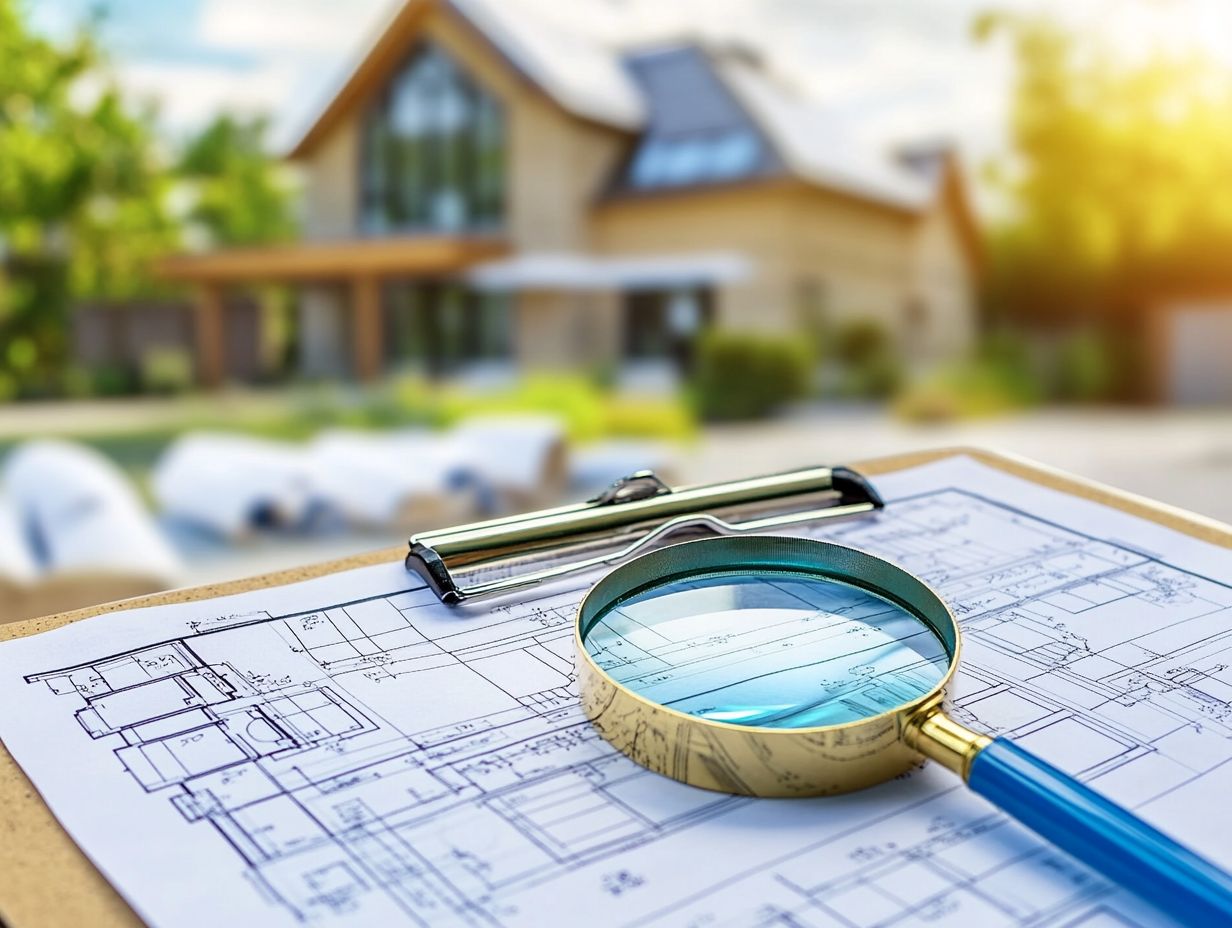
Home inspections are crucial in identifying potential issues with a property before purchase, providing peace of mind for buyers. Familiarize yourself with common home inspection terms and their definitions to better understand the report. To gain deeper insights, consider understanding the process of home inspections as you review the report and pay attention to major structural and mechanical issues to address them before closing the deal.
Understanding Home Inspection Terms
Understanding home inspection terms is essential for you as a homebuyer or property owner. This knowledge provides clear insights into the home inspection report, highlighting potential safety concerns or defects that could develop over time.
A home inspection covers various components, including the state of the roof, plumbing systems such as PVC pipes and water heaters, and structural elements like Hardie boards, fascia, and soffits. These elements play a vital role in the overall safety of your home.
It addresses critical aspects like air gaps, expansion tanks, and the importance of proper flashing at junctions, ensuring that every detail of your property is thoroughly evaluated to prevent future complications.
What is a Home Inspection?
A home inspection is an in-depth assessment of a property’s condition, meticulously evaluating its structural integrity, plumbing systems, electrical wiring, and heating, ventilation, and air conditioning (HVAC) systems to unearth any existing or potential issues.
During this comprehensive process, various elements such as the roof, foundation, windows, and doors are examined to ensure compliance with building codes and safety standards. Inspectors also look for signs of moisture intrusion, pest damage, and proper ventilation all vital for maintaining the property’s health.
Their findings are compiled into a detailed inspection report, highlighting safety concerns, necessary repairs, and recommendations for future maintenance. By keeping these critical aspects in mind, homeowners can proactively tackle issues before they escalate, protecting both their investment and the well-being of everyone who resides within.
Why is it Important?
The significance of a home inspection is paramount, especially for you as a home buyer. It acts as an essential tool for uncovering both major defects and minor issues that could escalate into serious safety concerns and expensive repairs down the line.
Imagine touring your dream home, excitement bubbling over, only to later find out that the foundation has serious cracks, putting its structural integrity at risk. A comprehensive inspection would have flagged those issues right away, giving you the power to make an informed decision or negotiate necessary repairs with the seller.
This process helps you avoid financial pitfalls and aids existing homeowners by pinpointing areas needing maintenance, like an aging roof or outdated electrical systems that could pose safety hazards. By understanding these factors, you can immediately safeguard your investment and ensure a safe, comfortable living environment.
Common Home Inspection Terms and Definitions
Grasping common home inspection terms enables you, as a homeowner or buyer, to accurately interpret inspection reports and make informed decisions about property maintenance and repairs. This understanding of the basics of home inspections is crucial in ensuring that your investment remains secure and sound.
Structural Components
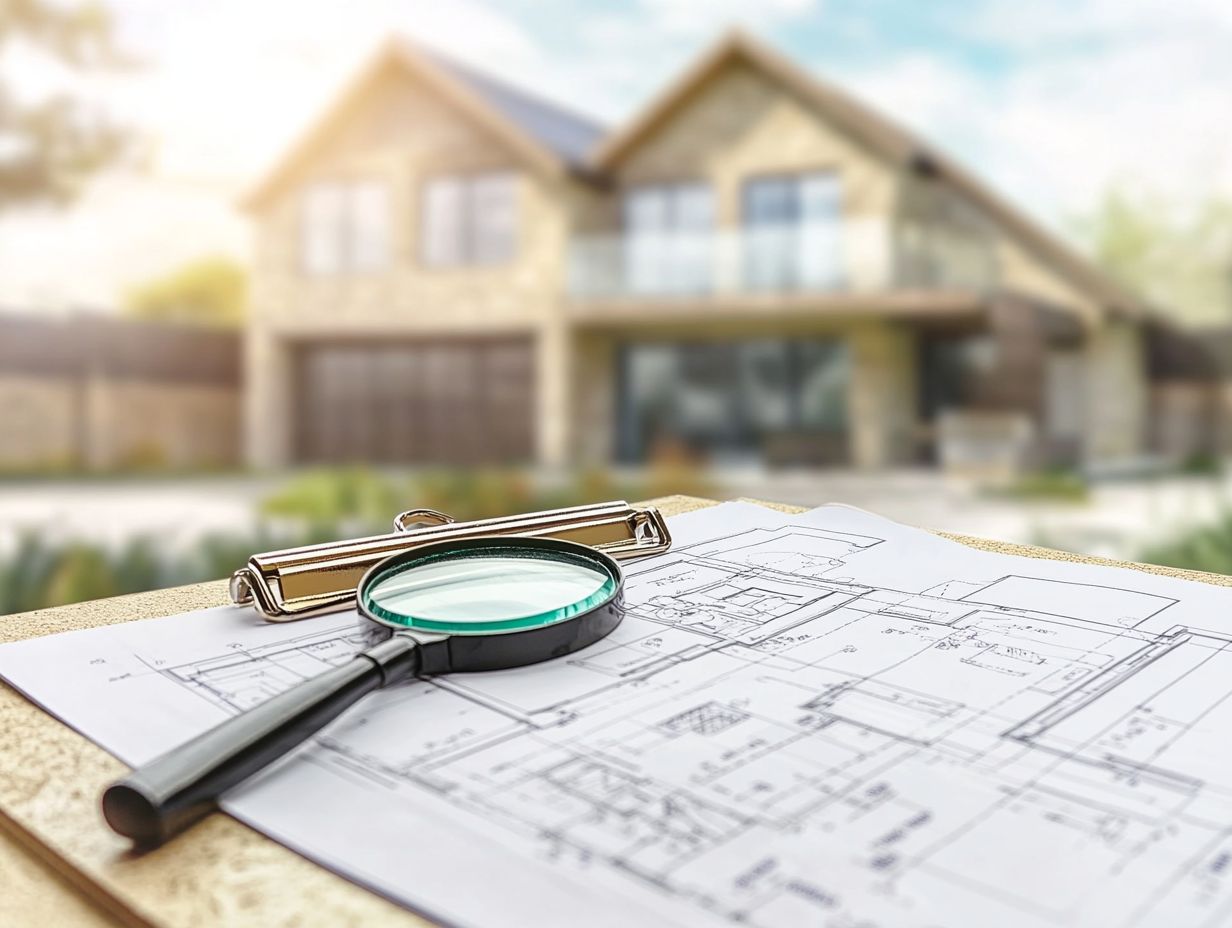
Structural components are essential elements evaluated during a home inspection. They include hardie boards, fascia, soffit, the roof, and the foundation’s condition.
Each aspect plays a crucial role in your building’s safety and durability. Checking these components helps you spot potential issues that threaten structural integrity.
For instance, damaged fascia can lead to water damage and pest problems. Deteriorating soffits might indicate ventilation issues that affect energy efficiency.
Inspectors also closely examine the roof for missing shingles or signs of wear. Such defects can increase the risk of leaks and cause interior damage.
A solid foundation is critical. Cracks or settling issues may signal serious problems that jeopardize the entire structure.
By recognizing these concerns early, you can save on costly repairs and ensure your home stays resilient for years!
Mechanical Systems
Mechanical systems are vital in a home inspection. This includes plumbing, electrical systems, HVAC (heating, ventilation, and air conditioning), and appliances like water heaters.
These components are crucial for your home s safety and functionality. During an inspection, they undergo thorough checks for efficiency and safety.
Inspectors look for common issues such as outdated wiring, leaky pipes, or poor heating and cooling performance. Each problem can lead to major headaches for homeowners.
A malfunctioning HVAC system can raise energy bills or cause discomfort during extreme weather. Leaking pipes might lead to water damage, mold, and costly repairs.
Understanding the condition of these systems can guide both buyers and current homeowners toward informed decisions!
Exterior Features
Exterior features are crucial for your home s integrity. This includes air gaps, drip edges, flashing, and the condition of fascia and soffit.
These elements enhance your property’s appeal and protect against environmental damage. Properly installed drip edges direct water away from your foundation, preventing issues.
Efficient flashing minimizes the risk of water penetration, reducing mold and wood rot. By checking the fascia and soffit, you can uncover problems like pest infestations.
If left unaddressed, these issues can threaten your home s safety and structural integrity. Being proactive can save you significant repair costs down the road!
Interior Features
Pay close attention to interior features during a home inspection, such as mold, HVAC systems, wiring, and kitchen appliances. These elements are key to a safe and functional indoor environment.
Mold in humid areas can pose serious health risks. A malfunctioning HVAC system might lead to uneven heating or cooling.
Outdated wiring can create safety hazards, potentially causing fires. Malfunctioning kitchen appliances can disrupt daily routines and lead to expensive repairs.
Addressing these concerns helps enhance your home’s livability and value!
Interpreting Home Inspection Reports
Understanding home inspection reports is crucial for grasping a property’s condition. These documents highlight major defects, minor issues, and safety concerns that may require immediate attention!
Recognizing these details gives you the power to make informed decisions about your investment. Take charge of your investment today!
What to Look for in a Report
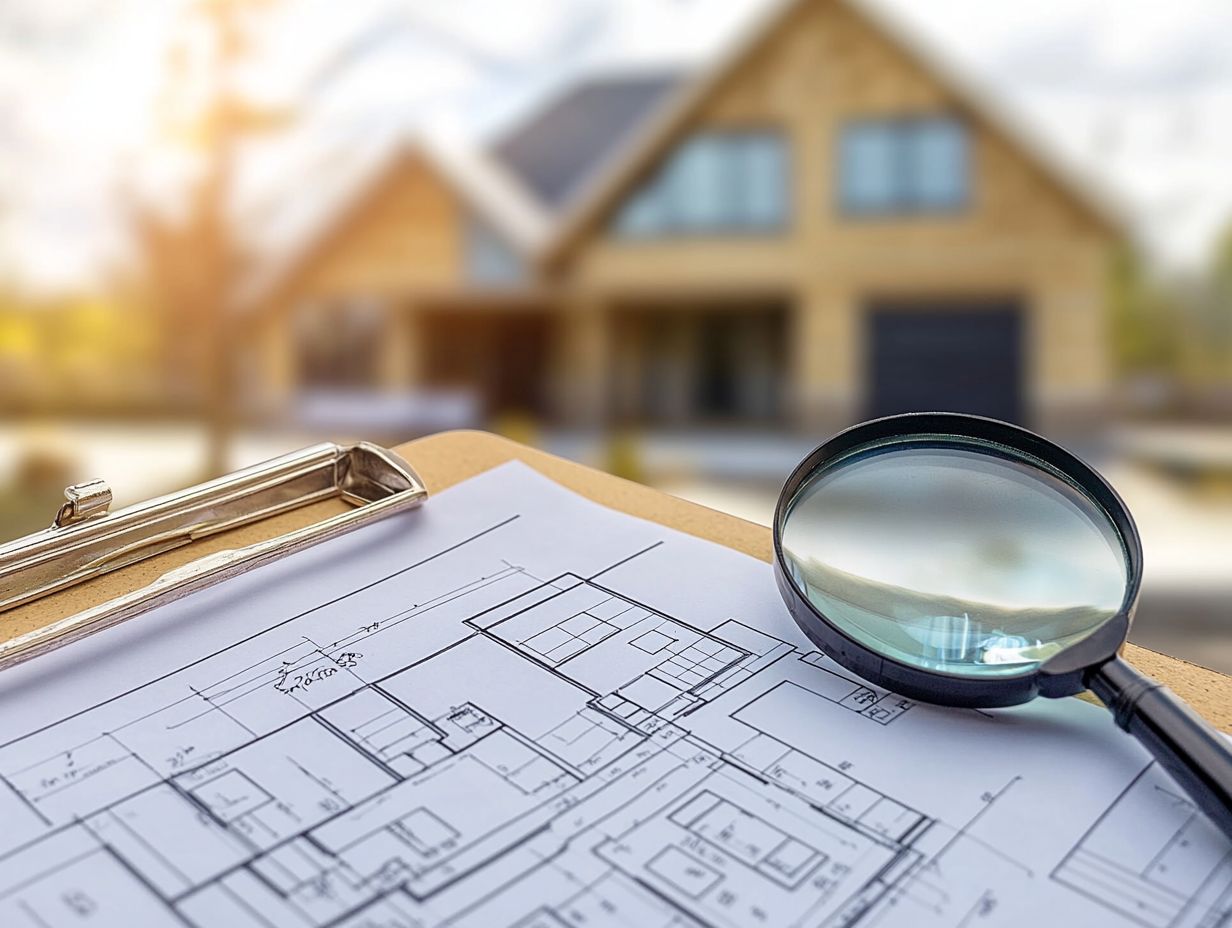
When reviewing a home inspection report, it’s crucial to focus on safety issues, major defects, and minor defects. This helps you assess the overall health of the property and make a plan for necessary repairs.
The terminology in these reports can be daunting, so it’s essential to familiarize yourself with commonly used terms like “the strength of the home’s structure” and understanding the home inspection process, including “the safety of electrical systems.”
As a homebuyer, you should especially scrutinize findings such as roof damage, which may indicate an immediate need for replacement, versus minor cosmetic issues like peeling paint that can wait without compromising safety.
For example, if an inspector points out potential moisture intrusion in the basement, understanding these details will prepare you for a more informed discussion with contractors. This insight can be invaluable in guiding your decision-making process regarding negotiations or future maintenance plans.
How to Address Issues Found in the Report
Addressing the issues identified in a home inspection report is essential for preserving both the safety and value of your property. This helps you focus on major defects and make a plan for minor maintenance concerns.
By carefully checking each section of the report, you can pinpoint which repairs require immediate attention and which can be scheduled for a later date. Start by categorizing the issues into three distinct groups:
- Critical safety concerns,
- Significant defects that could lead to further damage,
- Minor cosmetic repairs.
For serious structural problems or electrical issues, it’s wise to hire experts. This ensures that the necessary corrections are made to uphold the integrity and safety of your home.
Conversely, you may discover that many cosmetic issues like repainting or small drywall repairs can be easily managed with do-it-yourself fixes. This not only saves you time and money but also enhances the overall appeal of your home.
Choosing a Home Inspector
Selecting the right home inspector is an essential step in your home-buying journey. Their qualifications and expertise significantly affect the quality of the inspection report, which in turn can have a profound impact on the safety and value of your prospective property.
Qualities to Look for in a Home Inspector
When selecting a home inspector, seek out qualities such as relevant qualifications, extensive experience, and a solid grasp of home inspection protocols. This ensures a thorough evaluation of the property s condition.
An effective home inspector should ideally have formal education in construction, engineering, or a related field. This foundation equips them with essential knowledge of building systems and structures.
Necessary certifications from recognized organizations indicate their commitment to ongoing education and adherence to industry standards. Practical experience is equally vital; seasoned inspectors have likely encountered diverse scenarios, honing their ability to identify potential issues with precision.
By prioritizing these attributes, you can secure a reliable and informative inspection, ultimately giving you the power to make informed decisions as a potential buyer.
Questions to Ask Before Hiring
Before you hire a home inspector, it s essential to ask the right questions about their qualifications, experience, and inspection process. This ensures that they meet the necessary standards for a thorough evaluation of the property.
You want an inspector who understands the technical aspects of the inspection and excels at communicating their findings. Key questions to consider include inquiries about their certification, years in the industry, and familiarity with local building codes.
It s also beneficial to ask how many inspections they conduct annually, as this can reflect their expertise. Understanding their inspection methodology whether they utilize advanced technologies or stick to traditional techniques provides valuable insight into their thoroughness.
Each question you pose helps gauge the inspector s competence and reliability, giving you the power to make informed decisions and protect your investment.
Frequently Asked Questions
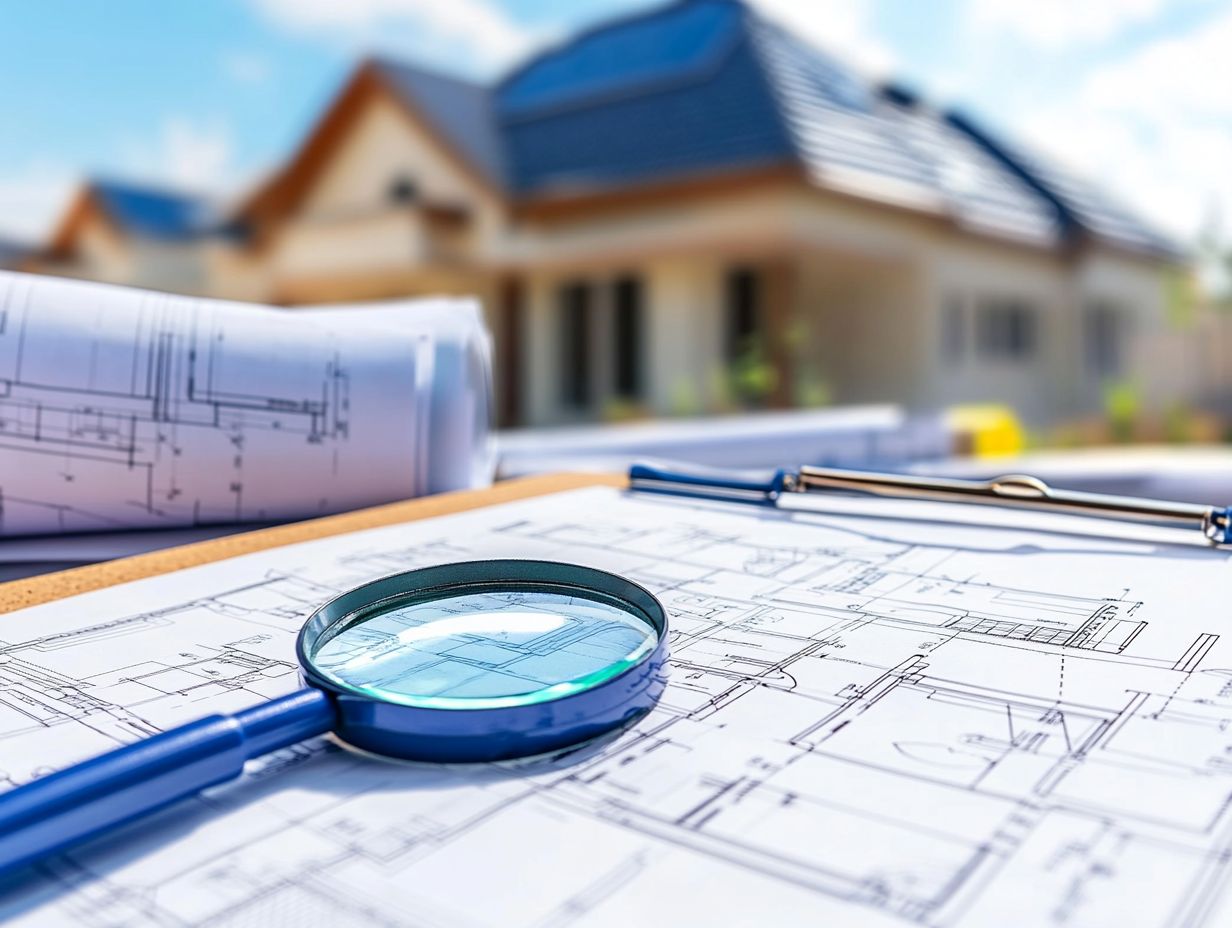
What are home inspection terms?
Home inspection terms are words and phrases used by inspectors to describe a home’s condition and features, making it vital to understand the basics of home inspection reports.
Why is it important to understand home inspection terms?
Understanding these terms helps buyers and homeowners grasp inspection reports. Additionally, knowing how to read a home inspection report enables informed decisions about their property.
How can I make sense of home inspection terms?
Research common terms used in inspections and ask questions during the inspection. For a deeper understanding, refer to guides on how to read and interpret your home inspection report to seek clarification from your inspector.
Are there any resources available to help me understand home inspection terms?
Yes! You can find online glossaries, books, and videos that explain home inspection terms and their meanings, including understanding the home inspection process.
Can I negotiate repairs based on home inspection terms?
Absolutely! If the inspection uncovers significant issues, use the report to negotiate repairs or a better price with the seller.
Do all home inspection terms have the same meaning?
Not always. Some terms can vary based on region or inspector preferences. To gain a clearer perspective, refer to resources on understanding home inspection reports and always clarify any terms you’re unsure about with your inspector.




